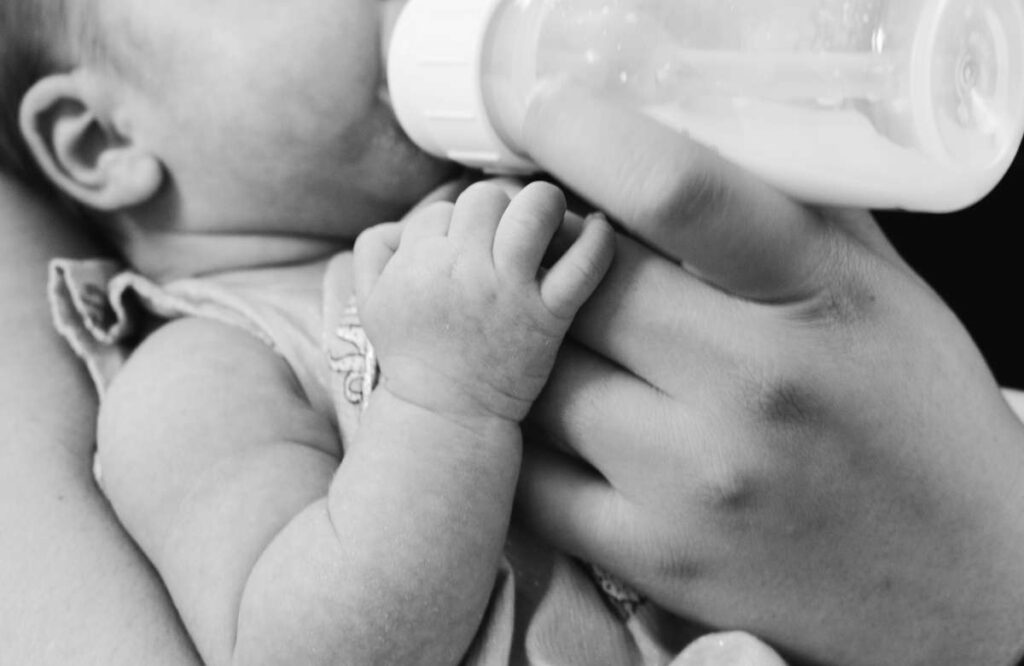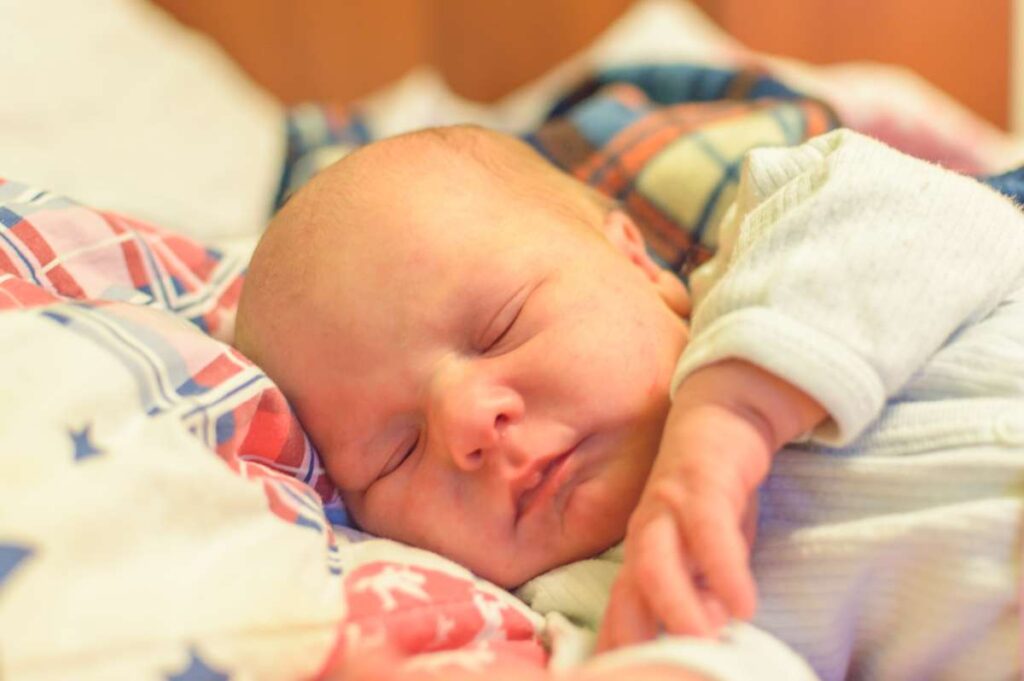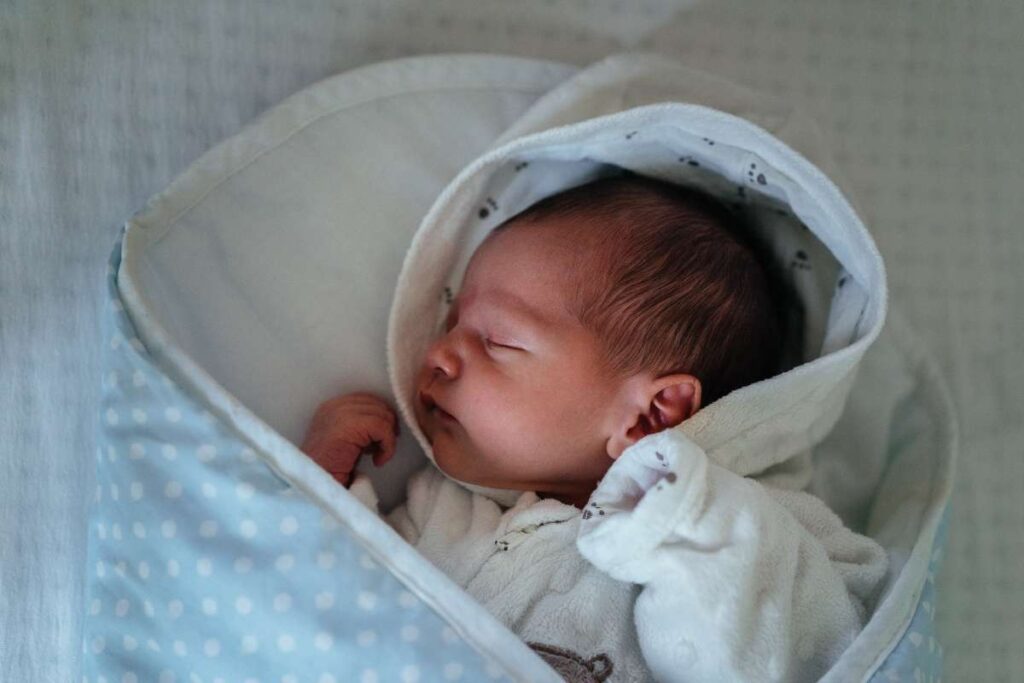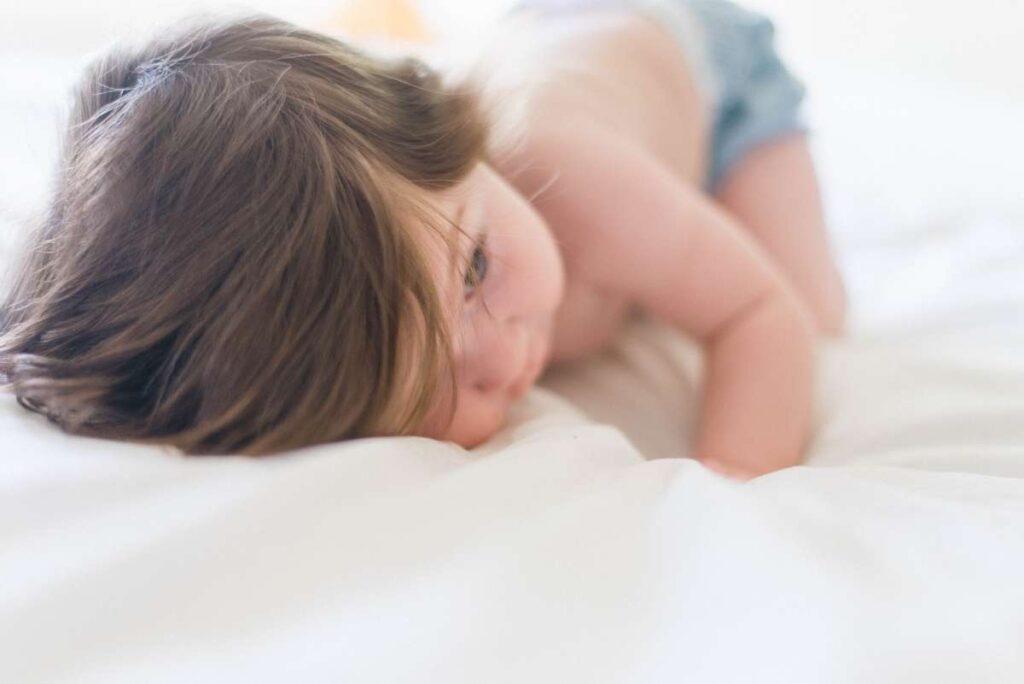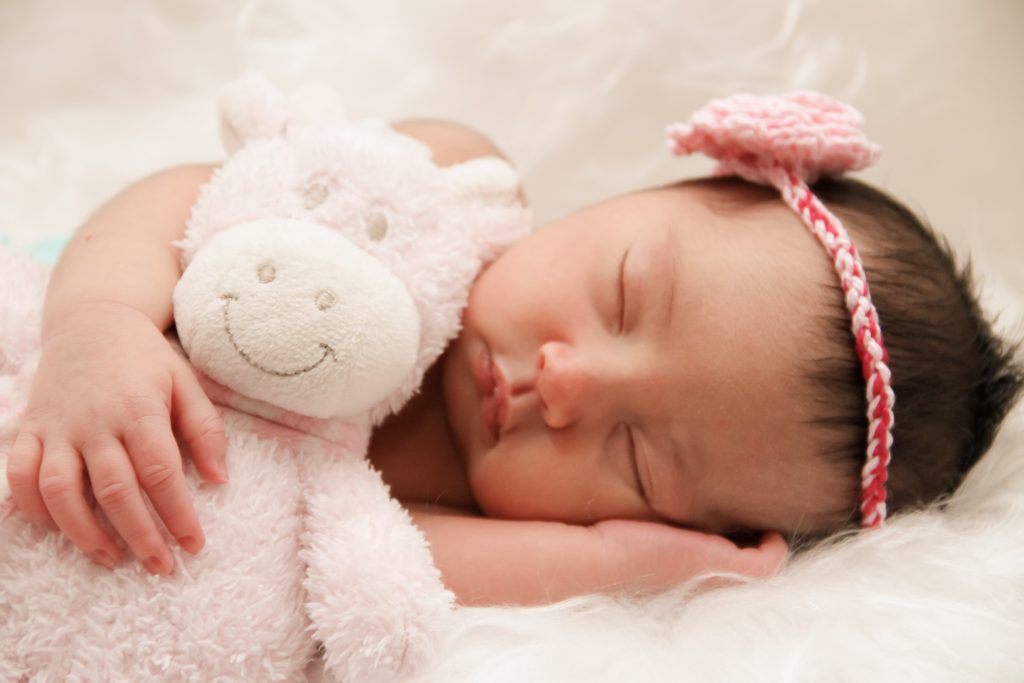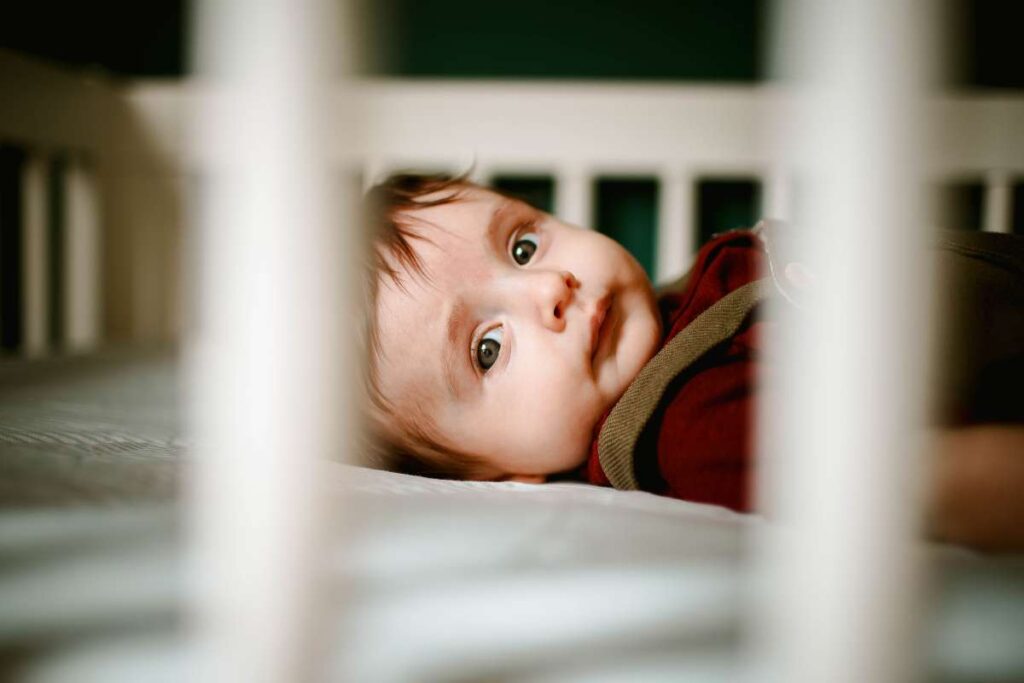The topic of a baby's sleep seems to generate endless discussion. We like to assume this is because a good night's sleep for the baby is a fantastic leveller for all parents. It's only natural to worry that the thing that finally puts your baby to sleep won't be recommended.
Putting your baby to bed with a bottle is often touted as one of these miracle sleep aids. Do you feel comfortable putting your kid to bed with a bottle? It turns out that asking oneself that question and paying attention to the response is crucial for the growth and development of your baby.
One of the most common topics of conversation among parents is the art of putting a child to sleep. "Does the infant have regular sleep patterns?" "How long does it take to get the infant to sleep?" A common question is "How often do they wake up?" No one could be blamed for heaving a sigh of relief when their infant first learns to feed themselves or fall asleep to a bottle.
However, the American Academy of Pediatrics (AAP) advises against putting babies to sleep with a bottle. An infant may learn to associate the bottle and bedtime feedings. Those aren't the kinds of associations we hope to make with our children, but maybe yours are.
However, the increased risk of suffocation and the potential harm to the baby's future teeth are more worrisome. "Milk collected in your baby's mouth can cause catastrophic teeth decay, known as nursing-bottle caries," the American Academy of Pediatrics warns.
The available advice is unequivocal: never put the infant to bed with a bottle. Baby Center suggests a gradual weaning off the bottle to prevent the baby from associating the bottle with sleep. As your baby becomes less reliant on a nighttime snack to help them go asleep, you can gradually decrease the amount of liquid in the bottle at bedtime.
It's possible that the soothing effect is coming from the suckling rather than the liquid in the bottle, in which case a pacifier could be more appropriate. Nonetheless, What to Expect warns that there are both benefits and drawbacks to using a pacifier.
What to Expect, for one, presents studies that show that pacifiers can reduce the incidence of SIDS in babies, but the fact that your child may get attached to the pacifier is a potential drawback. What to Expect warns that, "especially after your baby evolves into a more obstinate toddler," it may be difficult to wean your child off the pacifier, just as it was with the nighttime bottle.
So what's the deal, in other words? Ultimately, it's up to each individual family to figure out what will work best for them, and it's important to remember that one family's solution may not be appropriate for another.
Different experts can draw different judgements about how to raise a child based on the same facts.
Although this is highly influenced by the parenting philosophy one subscribes to, all experts agree that putting a baby to bed with a bottle is bad for their teeth and should be avoided from the start.
Babies should never go to sleep with a bottle. Baby bottle feeding is a great time for parents to bond with their infants through physical contact, expressions of love, and other nonverbal cues. Further, there are a number of good reasons to avoid putting babies to bed with bottles, including their health and safety.
It's possible that your infant could suffocate.
When infants go to sleep while sucking on a bottle, they risk getting food or liquid lodged in their windpipes.
Cavities can form in your infant's teeth.
- Placing a baby to bed with a bottle or pacifier might cause sweet liquids to pool around their teeth while they sleep. The bacteria in their mouths consume the sugars as food, and the resulting acid attacks their teeth. In extreme cases, the front teeth may decay away entirely and need to be extracted. (Here's some information to help you take better care of your infant's teeth.)
- A higher rate of ear infections in your infant is possible.
- The ear structure of a newborn is not yet complete. If you give your baby a bottle while they are lying down, the milk may enter their ears and create an infection.
FAQs About Baby Nursery
Although it is normal for your child to nurse them to sleep, this is not a behaviour she is fostering. It is okay to bring your baby to sleep if you do not have a bad habit. Having a breast in his comfort zone is one of the best ways for him to relax and unwind. He takes this comfort when understaffed or sleepy.
The liquid from a bottle may enter the lungs of a crying baby and make them choke if they fall asleep while sipping on it. Also, as a child, your baby's teeth can decay. In sleeping, sugary liquids form around babies' teeth while resting in bottles or pacifiers.
According to the AAP, "Milk pooled in your baby's mouth can cause serious tooth decay, known as nursing-bottle caries." The available recommendations are clear: putting the baby to bed with a bottle is a big no-no.
Breastfeeding your child to sleep and for comfort is not a bad thing to do– in fact, it's normal, healthy, and developmentally appropriate. Most babies nurse to sleep and wake 1-3 times during the night for the first year or so.
Aim to get the bedtime bottle of milk completely out of your child's life by the time they're about 12 months old. It can be a tough habit to break, but rest easy knowing your baby doesn't need the calories in the milk.

There are risks associated with bottle feeding your baby in bed.
There are risks associated with bottle-feeding a baby in bed, but few parents are aware of them. Why you shouldn't put your baby to bed with a bottle in her mouth is discussed further below. This information is not meant to frighten you away from bottle-feeding your baby in bed, but rather to make you aware of the potential risks involved.
Risk of suffocation
Bringing the baby's bottle into bed is a great idea for you and your baby. Baby is propped up in his crib and you've got a constant stream of milk pouring into his little mouth from the bottle you're holding. The catch, though, is that this poses even greater risks.
There can be instances when the liquid is flowing too quickly for your infant to drink the milk. As a result, suffocation may occur for the infant. Adding insult to injury is the possibility of milk travelling down the windpipe and into the lungs.
Warning: Possible Risk of Suffocation
Is your baby's crib piled high with colourful pillows so you can prop him up to feed him? While awake, your child may like the bright colours and fun toys, but after he falls asleep, he may wriggle and move, bringing the pillows and blankets up to his face and nose, potentially suffocating him.
Danger of Decay in Teeth
Tooth decay may not have the same ominous ring as those two threats, but it still has its drawbacks. No parent wants to see their child unhappy. As he progresses to solid foods, you'll want him to enjoy the nutritious nuts you've been saving for him by encouraging him to crunch, bite, and chew on them.
It is possible that your infant will nod off before he finishes his bottle. You shouldn't use baby formula since the sugar in it will coat your kid's gums and teeth. Even though the teeth are only temporary, they save room in his mouth for his permanent teeth, which is recommended by the American Dental Association. You probably don't want to see this area ruined for good.
Threat of Ear Infection
Baby moodiness and pain are two side effects of an ear infection. If he can't even communicate his pain, he's completely powerless. If you are a parent or caretaker, you may feel just as powerless as he does because you have no idea what is wrong with your child.
Did you realise that bottle feeding in bed might lead to ear infections? It's possible that your infant will not finish his or her bottle every time.
There's a risk that if he doesn't swallow completely, the milk will pool in his mouth and eventually make its way into his ear canal, where it can invite bacteria.
You shouldn't let the potential dangers of bottle feeding stop you from doing it. You just need to be careful and implement some precautions:
- Putting a baby to sleep with a bottle in his mouth is dangerous.
- After each feeding, be sure to dry his mouth thoroughly.
- Check the size of the nipple hole.
- After each feeding, be sure to burp your infant.
To reiterate, baby bottles by themselves are never a threat. Holding the bottle incorrectly can be dangerous for him and give you sleepless nights.
Because these times with your infant will never come again, it's important to take care of them as described above. You can use bottle feeding as an opportunity to bond with your baby.
Is It Necessary to Give Babies a Bedtime Bottle?
When your child is smaller, it's fine to give them a bottle before bed or when they wake up in the middle of the night. Babies' stomachs are the size of an egg at about 10 days old, therefore they need formula or breastmilk to survive.
At the latest by the time they're six months old. Babies typically don't require the extra calories and nutrients provided by evening feedings. They obtain all the nutrients they need from the food they eat during the day.
Regardless of whether you're breastfeeding or giving your baby formula, feeding time is a calming experience for both of you. The activity aids in their unwinding process. You may be reluctant to stop giving them a goodnight bottle because you'll need to come up with a new method of providing nighttime comfort.
Exactly what are the drawbacks of a "Goodnight" bottle?
Feeding a fussy infant might be a quick and easy solution. Reason enough for many parents to keep it a part of their kids' nightly rituals. It serves its purpose admirably. It's draining to have to spend so much time at night using alternative calming tactics like rocking, bouncing, and singing.
But if you keep using feedings as a pacifier, what do you expect to happen? The first problem is that they won't develop any other coping mechanisms for getting to sleep. If your baby needs to be fed frequently throughout the night, you probably won't get much rest.
- Nighttime bottle feeding presents a number of challenges, including:
- Tooth rot
- Adopting unhealthful eating patterns throughout the day
- Extreme weariness on the part of the parents
The inability to budge on bedtimes (and thus the impossibility of actually going on a date).
I really get how challenging it may be to figure out how to put your baby to sleep when you're dealing with a
an efficient and useful instrument. We both did this before we learned how to train our sleep cycles.
When Should You Stop Giving Your Child a Bottle Before Bedtime?
Babies come in all shapes and sizes. Most babies are well-nourished and gaining weight by six months, but many of them still need a bottle at night until they are around ten months old. However, the longer the pattern persists, the more challenging it may be to alter.
Aim to wean your child off the bottle at night by the time he or she is 12 months old. Of course, if your infant is nursing to sleep, the situation is a little different. However, it can be helpful if you feel like your baby is attached to the breast and preventing you from getting anything done or getting enough sleep.
Help guide you through the process of teaching your child the skills they'll need to fall asleep and stay asleep on their own, regardless of where they are or who they're with. Your baby's cries will no longer keep you awake, and everyone in the house will be able to get some much-needed shut-eye.
When I Put My Baby Down For A Bottle, Why Does He Or She Fall Asleep?
The bottle has become a "sleep prop" for your infant, helping him or her relax and drift off. This is the issue, however. During a typical night of sleep, our bodies go through a number of different phases. Everyone, then, awakens at the same time as the end of one sleep cycle and the beginning of the next.
We've had plenty of time to practise now that we're adults. We have figured out how to put ourselves back to sleep so that we won't be aware of those brief awakenings.
Your kid may eventually learn to go asleep without the bottle, but for now, it's essential. She will gradually become more awake throughout those brief awakenings. Soon she will wake up and remember that she did not bring what she fell asleep with.
Neither she nor the bottle are currently hiccuping. Furthermore, what is she planning to do? Since this is her only known coping mechanism, she will start crying until you come and re-insert the bottle into her mouth. The bottle helps her relax and go to sleep.
So, we're going to help her to fall asleep much more peacefully and start sleeping through the night by introducing new, healthy, autonomous sleep habits and breaking this old sleeping habit.
My free download will guide you through the seven methods I've used to teach hundreds of parents to put their babies to sleep without their assistance. Simply provide us with your name, email address, and the date of birth of your child, and we will send you a PDF that you can save to your phone and refer to at any time.
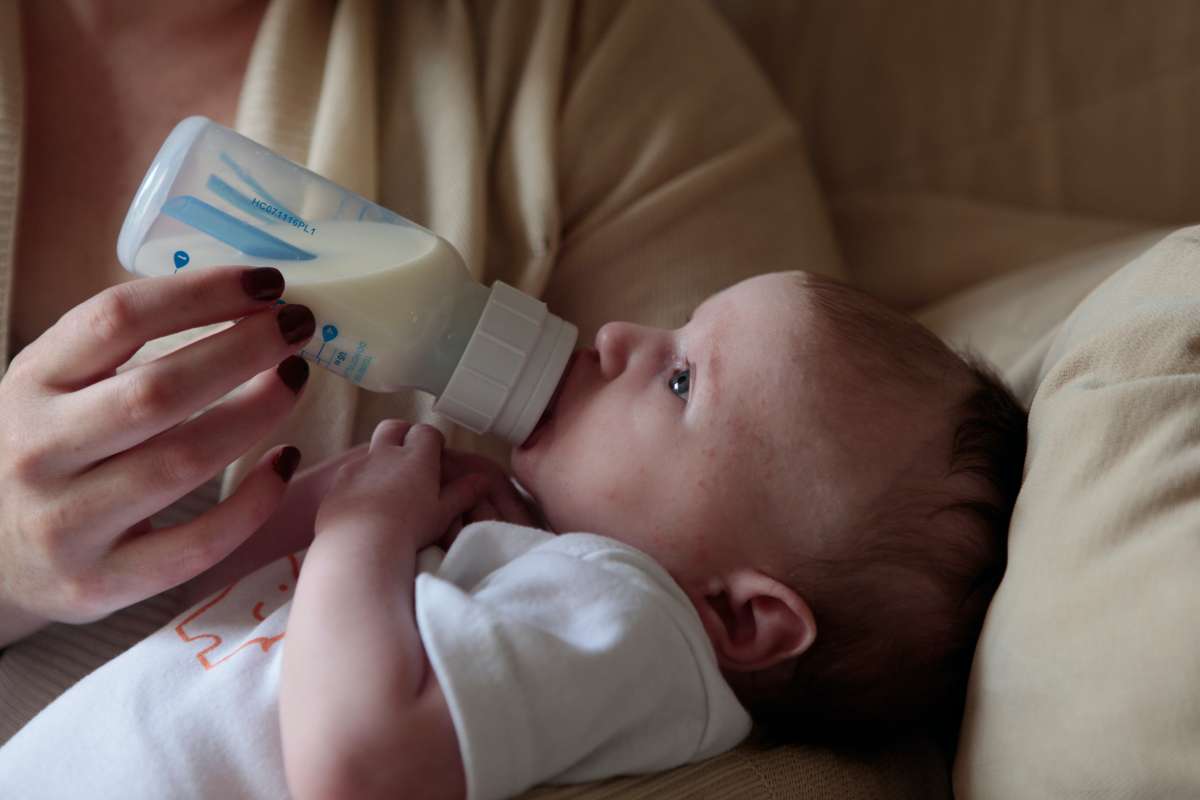
How to Stop Giving Your Baby a Bottle Before Bed
Altering the usual bedtime routine is the first step in weaning a child off of the bottle. Taking a bath is a good place to start. Next, get your infant into his or her pyjamas and a sleep sack. Both the Bitta Kidda and the Kyte Baby are two of my favourite brands of sleep sacks. After getting your infant clothed, you can give them the bottle and read them a few stories.
For added relaxation, we keep a white-noise generator in our bedroom at all times. Each of the bedrooms is equipped with its own white-noise generator. The use of white noise while sleeping can be beneficial for both you and your child.
As the night progresses, you will be awakened multiple times, each time potentially setting off your "fight or flight" response and ruining your sleep.
Certain types of noise can serve as alarm clocks for some youngsters, rousing them when it is not yet time to be awake. Don't let it happen to you; instead, use noise cancelling headphones to block out that noise and get some rest.
Feeling alert? Seems a tad bit chilling, no? And if she starts crying, what should we do then?
Sleep Conditioning for the Weak
Now is the time to begin sleep training, mommy! Never fear. To help you get through the two weeks it will likely take to get your baby on track and learn this new approach for putting themselves to sleep, the Live Love Sleep recommendations provide a strategy and a step-by-step plan.
And now, for some uplifting information. It's not necessary to listen to your fussy infant cry it out. Moreover, there is no need to even leave the house. You got that correct. If you'd prefer, you're welcome to stay with your newborn. When it comes to helping your baby learn to sleep without a bottle at night, we take a much more moderate approach.
Your infant may be able to go to sleep without a bottle if you help them make the connection between the various steps required in doing so. Your infant will likely continue to wake up for the bottle if you don't. You should try to kick the habit as soon as possible because it may continue far into year two.
Your presence and reassurance will be helpful while your child develops self-soothing skills and learns to fall asleep without your assistance. Your infant will develop a new sleep routine and begin getting the restful sleep he or she needs. Approximately two weeks may pass.
Conclusion
The American Academy of Pediatrics advises against putting babies to sleep with a bottle. Increased risk of suffocation and potential harm to the baby's future teeth are more worrisome. What to Expect warns that there are both benefits and drawbacks to using a pacifier as a nighttime comfort. Experts agree that putting babies to bed with a bottle is bad for their teeth and should be avoided from the start. Bottle feeding is a great time for parents to bond with their infants through physical contact.
There are risks associated with bottle feeding a baby in bed, but few parents are aware of them. There's a risk that if he doesn't swallow completely, the milk will pool in his mouth and eventually make its way into his ear canal, where it can invite bacteria. Putting a baby to sleep with a bottle in his mouth is dangerous. Babies typically don't require the extra calories and nutrients provided by evening feedings. Nighttime bottle feeding presents a number of challenges, including tooth rot and extreme weariness on the part of the parents.
Most babies are well-nourished and gaining weight by six months, but many of them still need a bottle at night until they are around ten months old. The bottle has become a "sleep prop" for your infant, helping him or her relax and drift off. How to Stop Giving Your Baby a Bottle Before Bed is the first step in weaning a child off of the bottle. Taking a bath is a good place to start. After getting your infant into his or her pyjamas and a sleep sack, read them a few stories.
Use noise cancelling headphones to block out that noise and get some rest. It's not necessary to listen to your fussy infant cry it out. There is no need to even leave the house. Your infant will develop a new sleep routine and begin getting the restful sleep he or she needs.
Content Summary
- Putting your baby to bed with a bottle is often touted as one of these miracle sleep aids.
- However, the American Academy of Pediatrics (AAP) advises against putting babies to sleep with a bottle.
- However, the increased risk of suffocation and the potential harm to the baby's future teeth are more worrisome. "
- Milk collected in your baby's mouth can cause catastrophic teeth decay, known as nursing-bottle caries," the American Academy of Pediatrics warns.
- The available advice is unequivocal: never put the infant to bed with a bottle.
- Baby Center suggests a gradual weaning off the bottle to prevent the baby from associating the bottle with sleep.
- Nonetheless, What to Expect warns that there are both benefits and drawbacks to using a pacifier.
- Although this is highly influenced by the parenting philosophy one subscribes to, all experts agree that putting a baby to bed with a bottle is bad for their teeth and should be avoided from the start.
- Babies should never go to sleep with a bottle.
- Further, there are a number of good reasons to avoid putting babies to bed with bottles, including their health and safety.
- Cavities can form in your infant's teeth.
- Placing a baby to bed with a bottle or pacifier might cause sweet liquids to pool around their teeth while they sleep.
- Here's some information to help you take better care of your infant's teeth.)
- A higher rate of ear infections in your infant is possible.
- There are risks associated with bottle feeding your baby in bed.
- Baby is propped up in his crib and you've got a constant stream of milk pouring into his little mouth from the bottle you're holding.
- There can be instances when the liquid is flowing too quickly for your infant to drink the milk.
- As a result, suffocation may occur for the infant.
- Warning: Possible Risk of Suffocation Is your baby's crib piled high with colourful pillows so you can prop him up to feed him?
- Danger of Decay in Teeth Tooth decay may not have the same ominous ring as those two threats, but it still has its drawbacks.
- Threat of Ear Infection Baby moodiness and pain are two side effects of an ear infection.
- Did you realise that bottle feeding in bed might lead to ear infections?
- It's possible that your infant will not finish his or her bottle every time.
- Putting a baby to sleep with a bottle in his mouth is dangerous.
- After each feeding, be sure to burp your infant.
- You can use bottle feeding as an opportunity to bond with your baby.
- When your child is smaller, it's fine to give them a bottle before bed or when they wake up in the middle of the night.
- Regardless of whether you're breastfeeding or giving your baby formula, feeding time is a calming experience for both of you.
- You may be reluctant to stop giving them a goodnight bottle because you'll need to come up with a new method of providing nighttime comfort.
- Exactly what are the drawbacks of a "Goodnight" bottle?
- If your baby needs to be fed frequently throughout the night, you probably won't get much rest.
- Aim to wean your child off the bottle at night by the time he or she is 12 months old.
- Of course, if your infant is nursing to sleep, the situation is a little different.
- Help guide you through the process of teaching your child the skills they'll need to fall asleep and stay asleep on their own, regardless of where they are or who they're with.
- The bottle has become a "sleep prop" for your infant, helping him or her relax and drift off.
- Everyone, then, awakens at the same time as the end of one sleep cycle and the beginning of the next.
- Your kid may eventually learn to go asleep without the bottle, but for now, it's essential.
- So, we're going to help her to fall asleep much more peacefully and start sleeping through the night by introducing new, healthy, autonomous sleep habits and breaking this old sleeping habit.
- My free download will guide you through the seven methods I've used to teach hundreds of parents to put their babies to sleep without their assistance.
- How to Stop Giving Your Baby a Bottle Before Bed Altering the usual bedtime routine is the first step in weaning a child off of the bottle.
- Next, get your infant into his or her pyjamas and a sleep sack.
- The use of white noise while sleeping can be beneficial for both you and your child.
- Don't let it happen to you; instead, use noise cancelling headphones to block out that noise and get some rest.
- Sleep Conditioning for the Weak Now is the time to begin sleep training, mommy!
- To help you get through the two weeks it will likely take to get your baby on track and learn this new approach for putting themselves to sleep, the Live Love Sleep recommendations provide a strategy and a step-by-step plan.
- It's not necessary to listen to your fussy infant cry it out.
- When it comes to helping your baby learn to sleep without a bottle at night, we take a much more moderate approach.
- Your infant may be able to go to sleep without a bottle if you help them make the connection between the various steps required in doing so.
- Your infant will likely continue to wake up for the bottle if you don't.
- Your infant will develop a new sleep routine and begin getting the restful sleep he or she needs.
